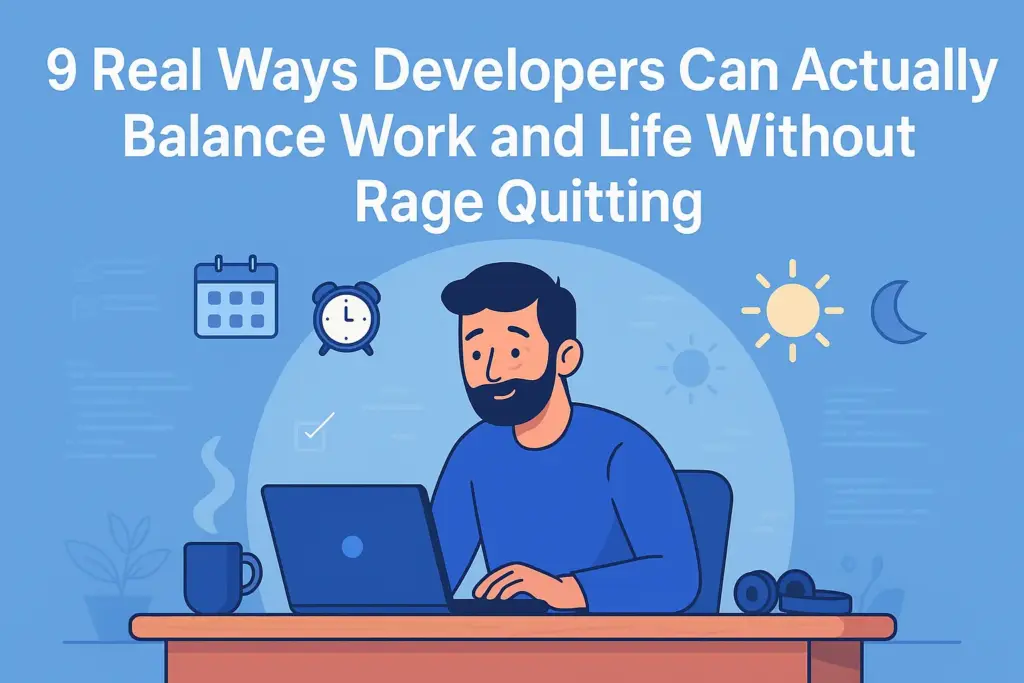“Just one more feature and then I’ll sleep.” If you’ve said this at midnight while debugging a race condition, you’re not alone. Work life balance for developers is often treated like an optional plugin. But if you want to code like a pro and not burn out like a candle, you need it installed — and running by default.
Balancing code, life, side projects, and a functioning spine is hard — but not impossible. The good news? Developers around the world are figuring it out without quitting tech or moving to a goat farm (though, tempting).
Why Work Life Balance for Developers Is Not a Luxury
Here’s the thing — developers don’t just punch keys. We build things, solve logic puzzles, fight merge conflicts, and sometimes cry into GitHub. That kind of mental work needs rest. But thanks to remote work, Slack creep, and the “always-on” vibe, we often trade rest for “productivity.”
Good balance isn’t about being lazy. It’s about protecting your ability to think clearly — and code without resenting your terminal.
1. Set Developer-Grade Boundaries
Don’t just say, “I’ll stop working around 6.” That’s vague and easy to override. Instead, try: “I close all dev tabs and mute Slack at 6:30 PM. No exceptions.”
If you need help with this, apps like Freedom, Forest, or RescueTime help block distractions and track screen time.
2. Use Git for Your Life Too
Think in commits: Work time ends → commit and push → life time begins. You can’t live in a permanent uncommitted state. That’s how merge conflicts with your personal life begin.
Create a habit of ending your day with a personal “push” — closing your laptop, noting tomorrow’s focus, and switching context.
3. Build a Shutdown Ritual
After writing your last line of code, don’t just switch tabs to YouTube. Actually “close the loop.”
Try this 5-minute shutdown ritual:
- Review what you completed today
- Write top 3 tasks for tomorrow
- Close all code + project tabs
- Physically move away from your desk
4. Move, Even If You’re Not Into Moving
We spend hours in chairs, hunched like parentheses. Get up. Stretch. Walk. Do 10 pushups during npm installs. Even low-effort movement improves blood flow and makes your brain stop feeling like spaghetti code.
Bonus: many devs say they get their best ideas mid-walk, not mid-scroll.
5. Say No Without Explaining Your DNS Settings
Just because you “can” fix production at 11 PM doesn’t mean you “should.” Saying no or “not right now” is a skill. You don’t owe your team your nights. Healthy boundaries don’t make you a bad dev — they make you a long-term one.
If you’re a people-pleaser, try scripts like: “That sounds important. Can we discuss that first thing tomorrow?”
6. Get a Hobby That Doesn’t Involve a Monitor
If your only hobbies are side projects and browsing dev memes, congratulations — you’ve accidentally merged work and life. Try something else. Cooking, music, gardening, even badly crocheting — it doesn’t matter. The point is to use your brain differently. You’ll return to your code sharper.
And no, debugging on the couch doesn’t count as “relaxing.”
7. Protect Your Weekends Like Production
Weekends aren’t catch-up time. They’re cache refresh time. Unless it’s an actual emergency, your Saturday shouldn’t involve deployments. And yes, a funny idea for a SaaS app can wait too (most of them are just Notion templates anyway).
Block off your weekends like you would for a prod server freeze — nothing goes live unless it’s urgent and approved.
8. Talk to Humans (Non-Devs Count Too)
You’d be surprised how good a conversation can be when it’s not about refactors or tech debt. Social connection helps reset your mind and reminds you that life exists outside your repo. Bonus: explaining your job to non-tech friends reminds you why it’s cool.
Go hang out with friends who think “Docker” is a delivery service. It’ll keep you grounded.
9. You’re Not a CI/CD Pipeline
Unlike your Jenkins job, you don’t need to run 24/7. Give yourself permission to be off. You’re not less valuable because you took an evening to just… exist. You’re a developer — not a robot that compiles on demand.
What recharges you: silence, mess, weird hobbies, long walks, boredom — these aren’t anti-productivity. They’re what make productivity possible.
Final Thoughts on Work Life Balance for Developers
Balancing work and life isn’t about less ambition. It’s about sustainable momentum. You don’t need to choose between writing great code and having a great life. You just need to build processes — for yourself — that honor both.
Remember: your brain is your biggest asset. Keep it well-rested, well-fed, and occasionally offline.
So shut the laptop, stretch your legs, and maybe go touch some grass. Your next idea might just come while you’re walking, not while refreshing Stack Overflow.
You can also read a similar post: Crunch Time for Developers: How to Survive
FAQ: Work Life Balance for Developers
Q: How many hours should developers work per day?
A: Most thrive around 6–8 focused hours. It’s not about clock time — it’s about depth and mental energy.
Q: Is it okay to code after hours for fun?
A: Yes — if it energizes you. If it feels like pressure or FOMO, that’s a red flag.
Q: How do I stop thinking about code after work?
A: Build a shutdown ritual, switch contexts completely (walk, hobby, people), and make it a habit.
Q: I feel guilty when I’m not working. What should I do?
A: Recognize that rest improves code quality. Guilt is not a metric — output is. Protect your energy like you protect your code.
Q: What if my company rewards constant availability?
A: Then it’s time to have a conversation — or look for a team that respects work-life health. Long-term productivity can’t survive burnout cycles.


